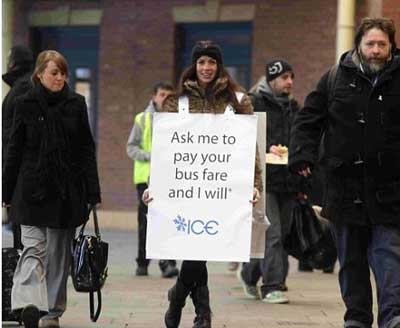当前位置: Language Tips> 双语新闻
 |
|
The majority of Brits were so cynical when it came to accepting a genuine offer of goodwill that they turned down free money.(Agencies) |
|
The majority of Brits were so cynical when it came to accepting a genuine offer of goodwill that they turned down free money, research has revealed. Cash was offered by five women to commuters at busy bus stations up and down the UK but an average of only eight people at each station, out of thousands of bus travellers, took up the offer. Women wearing a sandwich board that read "Ask me to pay your bus fare and I will" were positioned at bus stations in Newcastle, Medway, Manchester, Perth and Leicester, but were mostly just ignored. The experiment ran during morning rush hour each day for a week and just 38 people in total across the country accepted the offer. When questioned, the minority who did eventually accept the free cash admitted they were reluctant at first because they thought the offer was too good to be true. Those who did accept were generally teenagers, suggesting that the older we get, the more cynical of goodwill gestures we become. Results showed that 69pc of Brits were too suspicious to accept offers of goodwill and also felt rewards and freebies are often too good to be true, while only 23pc of people thought it possible to get something for nothing. The research was conducted by Ice, a loyalty scheme which rewards customers with Ice points for spending on eco-friendly goods and services. Jude Thorne, Chief Executive Officer of Ice, said: "Our experiment shows that as a nation, we simply don't accept the notion of genuine bargains, discounts and offers with no catch, despite admitting that difficult times are forcing us to seek them out actively." The company teamed up with Arriva UK Bus and Stagecoach Bus to offer free points redeemable against future purchases for customers who book their tickets online. (Read by Nelly Min. Nelly Min is a journalist at the China Daily Website.) (Agencies) |
最新调查显示,大多数英国人在接受出于善意的诚恳馈赠时,经常满腹狐疑,甚至白给现金都不要。 在调查中,由五位女性在英国几处人来人往的公交车站向上下班的人群发钱,尽管有数以千计的乘客上下车,但平均每个车站只有8个人接受她们的好意。 这几位女性把广告牌挂在身上,上面写着“你让我给你买车票,我就给你买。”她们站在纽卡斯尔、梅德韦、曼彻斯特、珀斯、和莱斯特的公交车站,但大多数人不理会她们。 这次试验在早晨上下班高峰期进行,为期一周,全英国总共只有38人接受。 在被问到时,少数最终要了钱的人承认自己最初也不想要,因为他们不相信会有这种好事。 接受了钱的人一般是青少年,这表明人们年龄越大,对善意的举动就越持怀疑态度。 试验显示,69%的英国人对善意的举动满腹狐疑,不愿意接受,而且经常不相信派发奖品和免费赠品这种好事。只有23%的人认为天上也有可能掉馅饼。 这项调查是由Ice忠实顾客奖励计划进行的,该计划给购买环保商品和服务的顾客奖励积分。 Ice公司总裁朱迪•索恩说:“我们的试验显示,英国人不接受真实的廉价商品、折扣、馈赠这种概念,总认为会上当,尽管我们承认眼下的困难时期正迫使我们积极寻找这些。” 该公司与英国Arriva巴士公司以及Stagecoach巴士公司联手开展了一项业务,对网络订票的顾客奖励积分,这些积分将来购物时可以冲抵现金。 相关阅读 (中国日报网英语点津 Julie 编辑:陈丹妮) |
|
Vocabulary: sandwich board: 挂在身上的广告牌 freeby: 免费赠品 catch: 圈套,隐藏的困难 redeemable: 可换成现款的 |
上一篇 : 研究:网络交友难觅真爱
下一篇 : 研究:开会让人变蠢
电话:8610-84883645
传真:8610-84883500
Email: languagetips@chinadaily.com.cn